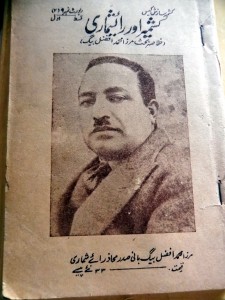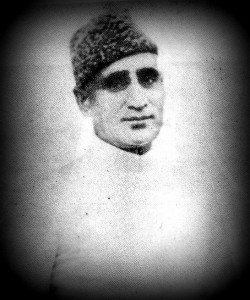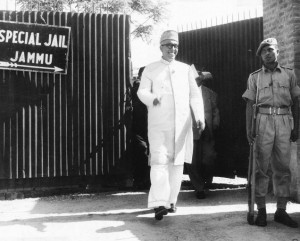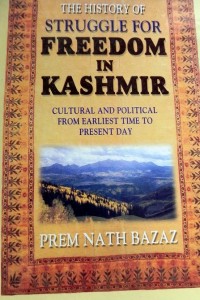Peace Watch » Editor's Take, Featured » Prem Nath Bazaz’s Writings and Kashmir Freedom Movement
Prem Nath Bazaz’s Writings and Kashmir Freedom Movement
Revisiting Bazaz’s Writings.
By
Z.G. Muhammad
I do not like Pandit Prem Nath Bazaz. So don’t many others in my tribe. Let me use a harsher word, I hate him for his Machiavellian role in 1935, in misguiding the protagonist of the movement led by the Jammu and Kashmir Muslim Conference. The Muslim Conference had largely adopted the 17 point memorandum presented in October 1924, by the Muslim intelligentsia to Viceroy Lord Reading seeking justice for beleaguered and discriminated against Muslims of the State as its manifesto. I have reasons to believe some historians that Bazaz at this juncture of our history was playing ‘fifth columnists’ role for the All India Congress in the State. And succeeded in causing birth of the National Conference and division in the Muslim leadership of the state that immensely contributed to what historian Alastair Lamb described as the ‘birth of a tragedy’. I also do not like him for his role during 1977 Assembly elections, when he successfully made smallest of small party fighting for right to self-determination to join the Janata Party and extended legitimacy to Abdullah’s U-turn and burial of the Plebiscite Front.
Notwithstanding, Bazaz enigmatic role in 1935 and 1939 and during the 1977 Assembly elections, for a student of contemporary Kashmir politics and history his writings become a compulsory reading. His post 1947, writings during his externment in New Delhi provide and insight into New Delhi’s Kashmir policy, candidly tell us how Sheikh Abdullah for pursuing his ambitions defrauded people of the State and also provide a slit to peep into the mindset of Jawaharlal Nehru’. In some of his writings of the fifties behind the façade of secularisms, Nehru emerges as a Hindu nationalist- as good as any Hindutva leader of his times. (Sheikh Abdullah after he took over as Prime Minister of State in 1947 had banished Bazaz from entering into the state)
Most of the writers and researchers focus on Bazaz’s major works which include, ‘Inside Kashmir’(1942), ‘Azad Kashmir- A Democratic Socialist Conception’ (1951), ‘The History of Struggle for Freedom in Kashmir’, (1954), Kashmir in Crucible (1967) and ‘Democracy through Intimidation and Terror (1978). Notwithstanding, some deficiencies in his major works, these do provide a sea of information for scholars for understanding the Kashmir Dispute, its perpetuation and dangers inherent in its non-resolution. During his externment in New Delhi, Bazaz wrote lots of booklets and Pamphlets and these by and large have escaped the attention of even some important British and American historians who have written books- magnum opus’ on the Kashmir Dispute.
Bazaz compares Nehru’s reneging his promise of allowing people their right to decide their future to his ‘loss of reason, vision and humanity.’ He denounces Nehru’s rhetoric about accession to India as complete, “a jumble of irrational, contradictory and irresponsible utterances”. He wrote, “If somehow Nehru’s balance of mind is restored it will not only emancipate downtrodden state people but also be a service to India, Pakistan and indeed to the whole world.”
He is against armed rebellion and sees it ‘unadvisable’, in his words, “it is bound to harm victims more than the enslavers.” He sees “non-cooperation” as way out for freedom but such a movement needs “better, stronger and wider organization.” In late fifties he had seen raising of Jihadi cries proving ‘counterproductive’. To see India see reason he writes ‘there is need to make Indian leadership to realize that no threat or coercion and no blandishment will move Kashmiris to abandon their grim resolve to throw away the yoke.’
In thirties, when Bazaz exchanged letters with Mahatma Gandhi and apprised about the emerging political scenario in overwhelming Muslim majority state he was his great admirer but in his book Azad Kashmir- which is in question-answer format he squarely blames Gandhi for partition of the British India. In response to his own question blaming Quaid-e-Azam for partition of India and denouncing Kashmir joining Pakistan as disastrous. He attributes the partition to Gandhi’s dying the Congress in Hindu revivalism. “Since Mahatma Gandhi occupied the Congress stage the politics of this organization was deeply dyed in Hindu revivalism. ‘Back to Vedic and Puranic’ times has been battle cry of Mahatma while fighting British imperialism. No doubt, it awakened the backward and religious ridden Hindu masses emotionally, but at the same time it did great harm. It antagonised Muslims and all non-Hindus.” Gandhi’s this mindset gave birth to the two nation theory and finally to the birth of Pakistan. (P 21-22) This politics of Gandhi is responsible to the Hindu revivalist politics that strengthened Hindu extremism. Ironically, when ‘Gandhi saw a ray of hope in Kashmir, it was not Hindu Muslim amity as is commonly believed but it was in the Vedic past of the land.
In a pamphlet titled ‘Truth About Kashmir’, Bazaz has deconstructed the GOI discourse about tribesmen descending in to the state. He writes no fair minded person approve Indian version calling tribes men as ‘aggressor’. “It is proverbial kettle calling pot black”
In fifties Bazaz strongly believed that granting of right to self-determination was only the way for bringing lasting peace in the region. In one of the pamphlets titled ‘Voice of Supressed Kashmir’ published in 1953, articulating the deep aspiration of people of the state for right to self-determination he writes, ‘Those who are causing the delay in the final settlement in any manner are only paving way for extremists to lead exasperated masses.’
Prem Nath Bazaz’s writings of the fifties that call for in-depth study are a lodestar for a student of contemporary Kashmir politics.
Published in Greater Kashmir on 3 August 2015
Filed under: Editor's Take, Featured · Tags: Prem Nath Bazah, Sheikh Abdullah, Zahid G Muhammad








